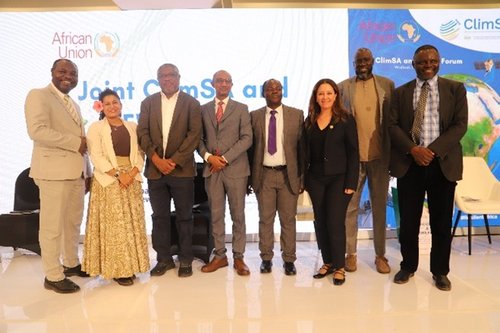
2 July - Windhoek, Namibia - The need for effective climate services and robust early warning systems has never been more urgent, considering that tropical cyclones, floods, droughts, and other hazards in 2024 led to the highest number of new displacements recorded for the past 16 years, destroying homes, critical infrastructure, forests, farmland and biodiversity.
According to the World Meteorological Organisation (WMO), tropical cyclones, like Cyclone Chido—which caused casualties and economic losses in Mayotte, Mozambique, and Malawi last December—were among the most devastating events of 2024, exacerbating food crises and inflicting massive economic damage.
In this context, the African Union Commission (AUC), with the support of the European Union, is spearheading transformative initiatives to enhance climate resilience across its continent, and convened a global forum in Windhoek, Namibia to leverage insights from two flagship programmes —the Intra-ACP Climate Services and Related Applications (ClimSA) and Space for Early Warning in Africa (SEWA).
ClimSA Pacific was invited to attend the global forum to share insights and best practices from the Pacific region on how climate services are being mainstreamed to support decision-making at regional, national and community levels.
Knowledge Broker for ClimSA Pacific, Ms. Patricia Mallam, participated in plenary sessions and chaired the side event on Disaster Risk Reduction. Her participation was fully funded by the AUC.
The topic which received the most engagement was how the Pacific region is operationalising the WMO-developed User Interface Platforms (UIPs), which provide a structured approach for building successful interactions between climate service providers, researchers and users to co-develop actionable climate information.

“Similar to the African region, the Pacific also has diverse cultures, thousands of languages, a strong presence of tradition and religion, with an even stronger influence of digital technology and communications,” said Ms Mallam.
“These pose multiple challenges for providers of meteorological services when trying to meet the information needs of the end user, whether they are heads of state, farmers or the average person. One of the many lessons we have learned in the Pacific is the importance of investing in community engagement and local adaptation to ensure that the information being generated from scientific observations are relevant and usable. High-tech is useless if it doesn’t make sense to those who need it.”
ClimSA Pacific received accolades at the Joint ClimSA and SEWA forum. Professor Mansur Bako Matazu, UNDRR Expert on Early Warning and Disaster Management Operations for the Economic Community of West African States (ECOWAS) Commission, also the (former) Expert in Climate Services Applications at African Centre of Meteorological Application for Development (ACMAD) commended ClimSA Pacific’s achievements.
“The presentation was highly relevant to the African States, especially in illustrating how tailored climate services and inclusive partnerships can enhance resilience in vulnerable regions. The parallels with the African context - particularly regarding island and coastal vulnerabilities, were insightful,” said Professor Matazu.
“What stood out most was the strong community engagement model adopted in the Pacific, along with the integration of traditional knowledge into early warning systems. The strategic alignment with policy at both national and regional levels is something African countries can adapt and learn from. The case studies were clear and compelling, offering practical lessons for other ClimSA partners. It would be beneficial to have future platforms for Pacific–African collaboration, enabling shared innovation and co-learning around climate services.”
About ClimSA Pacific:
The Climate Services and Related Applications (ClimSA) Programme in the Pacific is a transformative initiative funded by the European Union and implemented by SPREP in partnership with the ACP Secretariat. ClimSA Pacific aims to strengthen climate information services, enhance early warning systems, and empower decision-making across key sectors through tailored, actionable climate products. By supporting National Meteorological and Hydrological Services (NMHSs) and regional coordination, ClimSA Pacific is building a more resilient and climate-informed Pacific community.
For more information, contact SPREP Knowledge Brokerage Officer, CLimSA Project, Ms Patricia Mallam on [email protected]